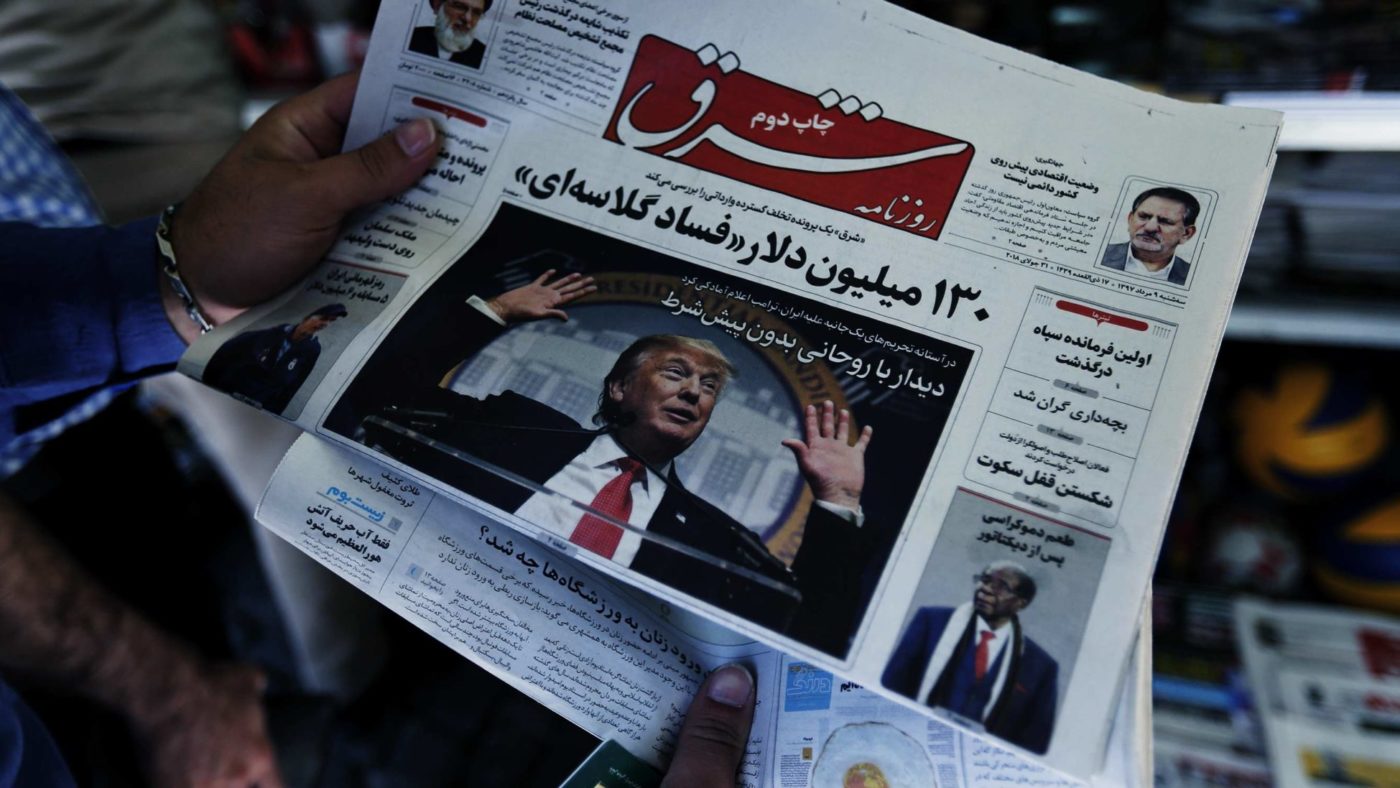Iran’s theocratic regime is a threat to the stability and peace of the Middle East. Yet President Trump’s response is a near-textbook case of irrationality and disruptive unilateralism. The dispute bodes ill in every respect.
The US imposed unilateral sanctions on Iran today. These affect, among other things, Iran’s purchases of US dollar banknotes, trade in gold and other precious metals, transactions related to the currency, and activities related to the issuance of sovereign debt. A further round of sanctions, scheduled for this year, will clamp down on Iran’s shipping and energy sectors. Nor is Iran the only target. Mr Trump says that anyone doing business with Iran will be excluded from trading with the US.
It needs to be said by America’s allies that the administration’s diplomacy is a capricious approach to a genuine problem. It bears comparison to the longstanding American embargo of Cuba initiated under President Kennedy and partially lifted half a century later by President Obama. This cemented Cuba’s autocracy in a policy of autarky that has left much of the country’s infrastructure and architecture literally crumbling, while arbitrarily punishing the activities of companies in Europe. And Mr Trump is pledged to undo this economic opening attempted by his predecessor.
It’s not as if the Trump administration is even consistent in its hostile economic diplomacy. The president has abased himself before the regimes of Vladimir Putin and Kim Jong-Un; he lacks any firm philosophical convictions, let alone liberal-democratic instincts, but appears to be impressed by the exercise of raw power. His obsequiousness to tyrants is matched by his determination to renege on the achievements of his predecessors.
The new sanctions on Tehran are intended as an alternative to the nuclear deal signed in 2015 between Iran and various world powers. Mr Trump’s withdrawal from this Joint Comprehensive Plan of Action is a disastrous course that he characteristically revels in. The deal was far from perfect precisely because it addressed a real threat with limited multilateral means.
No reputable think tank or independent observer believes that Iran’s nuclear programme in the last two decades has been intended purely for generating electricity. The technology required for nuclear energy is essentially applicable too for use in developing a nuclear bomb, and Iran has been caught in the past in building illicit facilities: a heavy water plant at Arak and uranium processing plant at Natanz. The 2015 deal was intended to halt progress towards a bomb by requiring an intrusive system of inspections. It was working, too, and its abrogation by the Trump administration has given Iran a green light to go back its old ways.
Tehran has long been engaged in supporting terrorism and undermining its neighbours. Since its client Bashar al-Assad launched a pitiless assault on Syria’s captive population in 2011, Iran has been indirectly responsible for a catastrophic civil war that has scattered some 11 million refugees. Its support for Hamas and Hezbollah threatens Israel and has undermined any hope of a two-state peace agreement with the Palestinian Authority.
There is no reason to trust in the regime’s good intentions. But that indeed was the reason for the nuclear deal. Some critics held out the hope that a military strike on Iran could stop its progress towards becoming a nuclear power, much as Israel’s bombing of the nuclear plant at Osirak in Iraq in 1981 stopped the regime of Saddam Hussein in its progress towards a bomb. It was an idle speculation, given that Iran took note of precisely that historical episode. Its nuclear facilities are either unknown or dispersed and protected. Attacking them would cost lives and have a huge diplomatic penalty. A draconian system of inspections could have mitigated the regime’s bellicose behaviour, if not its intentions. That option is no longer available; US withdrawal from the deal has rendered it otiose.
It does not follow that relations with Iran will necessarily worsen because of Mr Trump’s diplomacy. Perhaps, as its critics alleged, the multilateral deal conferred legitimacy on a regime determined on regional disruption, and economic sanctions can have an effect. In the early 1980s, the Reagan administration took a hawkish line on Western Europe’s plans to import energy from a Soviet trans-Siberian pipeline. In retrospect, there is little doubt that European dependence on energy from Russia has weakened the West’s opposition to the Putin regime’s aggression in Ukraine.
Yet the solidarity of the Western alliance is what containment depends on. Relations between the US and Europe will suffer from Mr Trump’s withdrawal from the nuclear deal with Iran and imposing unilateral sanctions. America’s allies have to live with an administration that does not understand the need for multilateral diplomacy, but they should not mute their criticisms. There is no good solution to Iran’s regional ambitions. Containment on the model of the Cold War is an unspectacular course to which there is no viable alternative.


